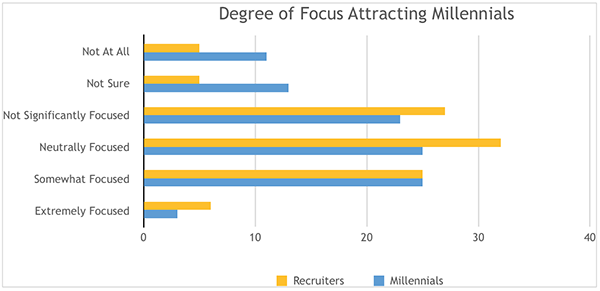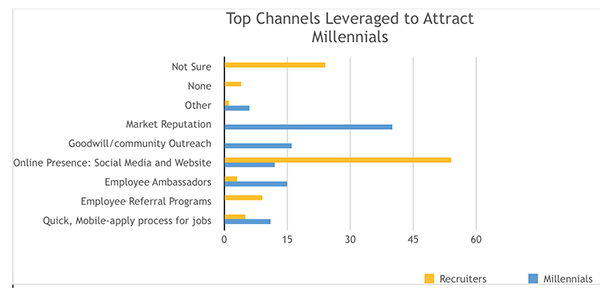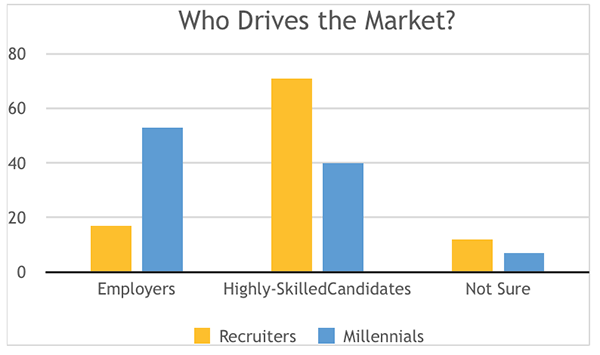Written by: Nicole Anglace
As a Millennial, I found the MRI Network 2017 Millennial Hiring Trends Study to be fascinating.
While I have commented on Millennials hiring trends in past articles, there are some aspects of this current study worth highlighting.
Analysis on Millennial Hiring
It has been said that by 2020, the largest generational cohort in the workforce will be the millennials. Despite this, MRI has revealed that Millennials feel that employers are not targeting the Millennial segment with respect to hiring.
In fact, nearly 75% of responders indicate that this focus is neutral or lower. MRI indicates that this lack of focus may stem from employers’ unrefined understanding of engaging the generation.
For me, the most shocking thing about these results isn’t so much the fact that Millennial’s feel that companies aren’t actively attracting them, but rather the fact that the recruiters who replied to these surveys offered sentiments that seemingly supported these hypotheses.

Disagreement is also evident on the most effective channel to attract Millennial employees. This disagreement flows from the perspectives of both recruiters and the Millennials themselves.

As the above graph indicates, Millennials place far more weight on a firm’s market reputation than they do online presence. This is not to say that online presence isn’t a valuable channel to cultivate and promote, but it is not where companies should focus the majority of their resources.
MRI further defines ‘Market Reputation’ to include such aspects as profitability, market competitiveness, and growth trajectory. These certainly are valuable pieces of information when considering where one would want to work. These factors not only provide the prospective employee with a broader sense of understanding for the company’s direction and success, but they provide a degree of illumination regarding the firm’s longevity and relative competitive advantage.
Key Attributes to Attract Millennials
There exists another dimension along which there is a disconnect between recruiters and Millennials in regards to the aspects of a company that attract Millennials when they consider a job move.

Clearly, the role that compensation and mentorship play from the perspective of the recruiter is being undervalued. Millennials indicate that these are, perhaps, the two most important tools they assess when looking at a company.
The other category, Opportunities for advancement, appears to be tied with Mentorship in terms of importance (both at 26%). However, unlike mentorship, recruiters seem to have a better grasp of the merits clear communication on this front can have. Acknowledging this knowledge gap can help companies avoid this misattribution in the future.
Who Holds the Power?
Perhaps the most intriguing discrepancy lies in the differences between the identified driving forces of the market for the two respective classifications of respondents. For the Millennials, the majority (53%) believe that the market is driven by the employer. Conversely, the majority of recruiters (71%) believe that the candidates are the driving force.

MRI indicates that the overall driving force is still unclear, yet they provide the following factors as support for their findings.
“Millennials see the market as being driven by the employer due to the lengthy hiring process, that often has little or no feedback,”
“Companies feel that Millennials have more control because they bring tech-savvy, new work approaches and specialty skill-sets to the table.”
Whatever the case may be, it is clear that there are some issues that need to be addressed. Based on MRI’s findings, there are two mains areas of focus necessary for attracting Millennial talent to your workforce: the can dos (communication) and the must haves (learning opportunities.)
In Conclusion
Millennials desire clear communication across the board. Starting during the hiring process and continuing throughout their tenure at your firm, open and honest communication is paramount. Such communication can provide clarity for potential employees during the hiring process, but can also help them visualize their career progression and better understand your expectations for them while at work.
Keeping in mind that Millennials are constantly engaging in opportunities for self-improvement, make sure that your company has offerings that will help them grow (mentorship and other such learning opportunities are a must have).
Given that Millennials ranked compensation and benefits as the most important attribute when considering a job, MRI notes that it may be wise to address this aspect of employment early on in the interview process. Doing so emphasizes your willingness to clearly communicate and your honesty can help set you apart from other firms.


